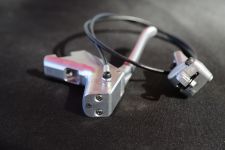CHICAGO, IL (BRAIN) — Hustling to respond to a serious recall, SRAM is sending out its cable-activated BB7 brake calipers and cable-pull levers so dealers can retrofit customers with recalled hydraulic disc brakes. Dealers tell BRAIN that the labor compensation offered to them to make the swap is fair.
In a message to the cycling world Tuesday, SRAM president Stan Day said that cable-activated brakes would likely be used as initial replacements for the recalled brakes, with hydraulic brakes coming later.
The recall and retrofit process is not official until the U.S. Consumer Product Safety Commission publishes its recall notice. Given the upcoming holidays, SRAM does not expect this until sometime in January.
“There is a rigid timeline to the CPSC’s recall process and we are working with them on this. But given the holidays the process is going to slow down,” said Brian Benzer, SRAM’s vice president of corporate development.
SRAM has notified assemblers and suppliers of OEM bikes to remove the recalled brakes immediately, and it is recalling aftermarket brakesets from distributors. It is doubtful that suppliers will ship the bikes with BB7 retrofits until the formal CPSC recall announcement.
Specialized, which invested heavily in disc brakes for its 2014 ‘cross bikes, is most affected by the recall with more than seven models in its line with the brakes. Giant has five models, and Trek has one or two SRAM-equipped hydraulic drop-bar bikes in its line.
“Giant has a sales stop on the affected bikes that are still in our inventory. They are not being shipped out; they are not being retrofitted with a substitute brake system,” said Patrick VanHorn, Giant’s corporate communications manager.
“We are also providing SRAM with a detailed list of the Giant retailers who purchased the affected models, and which bike models and sizes those retailers have. When a recall solution by SRAM is approved by the CPSC, SRAM and Giant will work together to get the affected bikes that are in the hands of our retailers corrected as soon as possible,” he added.
SRAM acknowledged it does not have enough substitute mechanical disc systems in inventory to replace all the recalled hydraulic brakes. The recall is worldwide, and it is recalling 38,000 brakes in the U.S. alone.
Distributors report that SRAM asked them to hold BB7 brakes in inventory. But so far the company has not asked for them to be sent back.
“SRAM is getting us BB7 kits as fast as they can. I’ve been able to service my customers bringing in bikes with the recalled brakes,” said Manuel Tenorio at the Johnny Sprockets store in Chicago. Johnny Sprockets sold several Specialized 'cross bikes with the brakes and also sold a few brake systems as upgrades to older bikes and as aftermarket product.
“It’s taking us about 40 minutes to swap out the hydraulic brakes for BB7s, and SRAM has compensated us well with product. I’ve got nothing to complain about there,” he added.
Dealers do not expect SRAM to be quick with a fixed hydraulic brake. The years of poor performing Avid hydraulic mountain bike disc brakes — some of which were also plagued by bad seals in the lever and caliper — followed by the current road brake issue, suggest SRAM may take a conservative approach in the future.
But a delay in deliverying a comparable hydraulic substitute for the recalled brakes will leave consumers and dealers — and SRAM — in an unpleasant situation. In many cases the recalled brakes were spec'd on expensive race bikes. What does a consumer or dealer do with an $8,000 bike that suddenly lacks its most notable feature?


